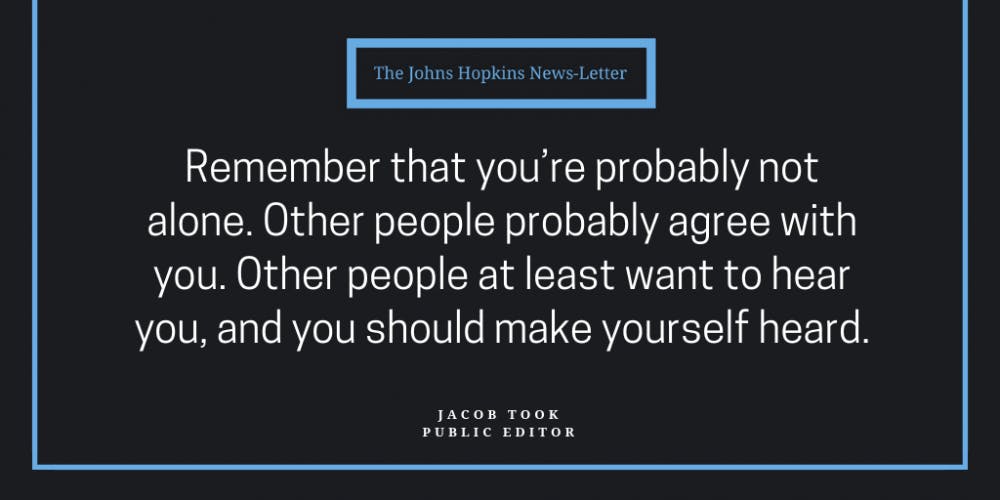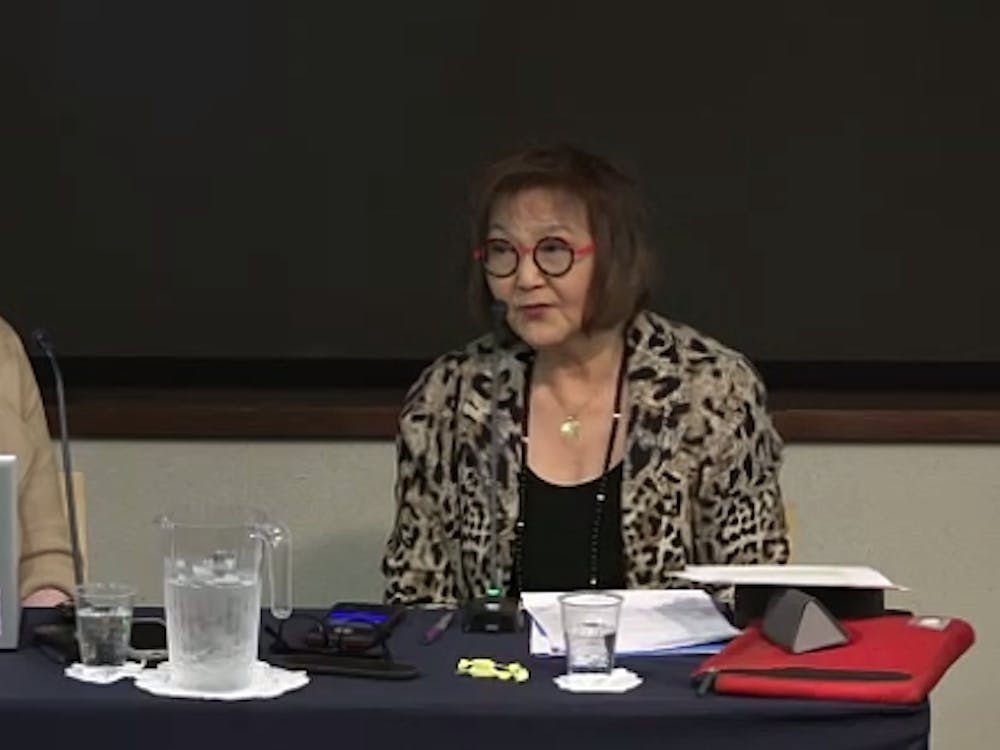
Here we are, two weeks into the semester. How’s everyone feeling? To the editors at The News-Letter, congratulations on the first issue of the year. To my fellow readers, congratulations on successfully kicking off another semester.
Sometimes, I might be called upon to address something egregious — misrepresentation of a source, major deficits in the previous week’s reporting. This is not one of those times.
Instead, I want to look a little closer at Opinions. Two pieces published last week caught your attention as readers — in “It is time for us to start respecting humanities majors at Hopkins,” the writer paints a pretty stark portrait of the campus culture toward the humanities, and in “Hopkins is (mostly) improving life on campus,” Opinions Editor Ariella Shua reflects on some of the changes in student life we’ve seen as the new year has gotten underway.
Given the perennial discourse about the humanities at Hopkins, a school with an insurmountable reputation in STEM, anyone who comes down with a strong view is bound to get some pushback. This piece, though, splits humanities students — in the comments on our Facebook page, a Writing Seminars alum writes that he had a great education and was never made fun of, while another reader just chimes in with, “Thanks, Captain Obvious.”
Shua’s piece generated a different kind of buzz. Some readers criticized the scope of the piece, in which Shua praises popular (or at least less controversial) initiatives like free laundry for underclassmen while sharing her frustration with more unpopular and polarizing changes like the relocation of many student services following the closure of Garland Hall after last spring’s sit-in, which ended with the arrest of seven participants.
Now, I agree that the scope of the piece is ambitious, and that by trying to unpack so many changes together we lose space for a more nuanced discussion. If the piece had focused only on one tension — for example, comparing free laundry to the lack of free printing — we might have reached a tighter conclusion.
But I also think the piece is balanced, doling out praise and criticism with an even hand. Most importantly, it’s one of the only student voices we’ve featured so far reflecting on all these big changes.
Last week’s news report on the University’s remarkable administrative shuffling features no students. A piece just on the Garland closure features just two students, each contributing a single quote. Why was the most prominent student voice speaking on the subject in last week’s News-Letter an Opinions piece by the paper’s own Opinions editor?
For me, the responses to both of these pieces begs a bigger question — what is the point of an op-ed? What does a writer hope to achieve when they publish their thoughts for others to read? And as the Opinions Editor, what is Shua’s role in all that?
When I asked Shua to weigh in, she told me that op-eds feel more urgent than the type of writing she dealt with in her previous role as Your Weekend Editor.
“People usually choose to write for Opinions when something is going on that matters to them that they want to say something about,” she said when we sat down for an interview just before Tuesday’s Editorial Board meeting. “The reason I like Opinions is because it’s very different from any other section in the newspaper. It’s really where people get very passionate about topics that matter to them.”
She stressed that these voices usually aren’t meant to represent groups or types of students — the writer of last week’s piece on the humanities doesn’t speak for all humanities students on campus. But it looks like they do, unless more humanities students share different perspectives.
Every section of The News-Letter aims to represent the student body. In a perfect world, the positive or negative bent of coverage on any issue would reflect student opinion — more positive on free laundry, more negative on Garland’s closure. We don’t live in a perfect world, but there are some things we can do to be more intentional about the way we represent student voices (in every section, but for now let’s focus on Opinions).
On principle, I don’t see a problem with the editor writing. It’s long-since been established that the Opinions Editor can write for the section (if they don’t have enough writers on a given week, they might not have a choice). But the section can’t represent as broad a range of students if the editor ends up filling the section every week.
Past editors have found the most success rousing writers by imposing a clearer structure on the section. Why not set prompts for writers to consider each week, encourage them to respond to pieces from previous weeks, curate head-to-heads that put student voices in dialogue and bring on writers as biweekly or monthly columnists (get them staff trained and they can even get a resume line out of it)?
If Shua succeeds in packing her section with student voices every week, where does her voice come through? Well, a huge part of the Opinions Editor role is stewarding the editorials — pieces that represent the consensus opinion of the Opinions Editor, the Editors-in-Chief, one Managing Editor and another section editor on a random weekly rotation. As the Public Editor, I contribute to the discussion each week but don’t write or edit the editorial before publication.
Editorials aren’t any more or less important than op-eds, but they have a different aim. Editorials represent The News-Letter, and the institutional weight The News-Letter carries as our only independent source of news on campus. Writing the editorials can be frustrating — sometimes, it’s not easy to reach a consensus. Maybe Shua puts it better:
“When you have six people in a room and you have to all agree on a topic that’s something even slightly controversial, not everyone’s going to have the exact same view even if it’s something that in general we all agree on,” she said.
The Opinions Editor is invaluable in guiding those conversations which shape the perspective of the paper. They must hold the editorials to the highest standard to make sure each one is balanced, clearly reasoned and built on facts. There may be no name attached, but this is where the voice of the Opinions Editor is most critical and should come through the most.
And readers, turn yourselves into writers by contributing to Opinions! While you’re considering whether to drop that Facebook comment, or chatting with your friends about an issue on campus, or even just mulling over something after you read it, remember that you’re probably not alone. Other people probably agree with you. Other people at least want to hear you, and you should make yourself heard.
I get it — you’re busy, you aren’t a writer, you’re not sure about how to share your thoughts. If you have some ideas, some thoughts, but you aren’t personally roused to take up a pen, why not email me or our Opinions editor with ideas? What would you like to see more student opinions on? Maybe your idea will prompt another student to raise their voice, and then you’ll have contributed to a little piece of Hopkins history.
We want you to be part of this conversation! We encourage our readers, particularly members of the Hopkins and Baltimore community, to email publiceditor@jhunewsletter.com with questions or comments about our practices and published content.





